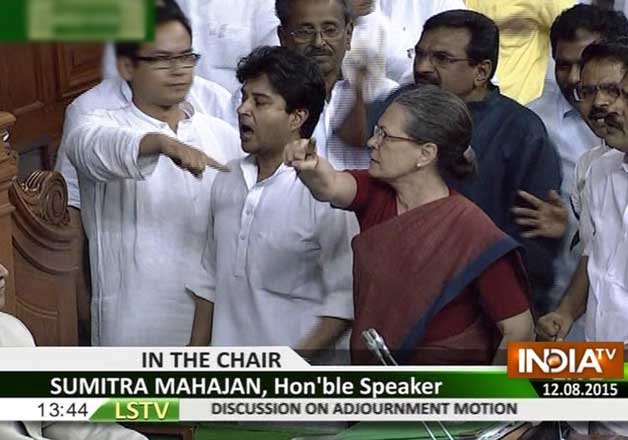
New Delhi: The parliament witnessed complete washout of Monsoon Session on account of standoff between ruling BJP and Congress-led opposition over issues like Lalitgate and Vyapam scam.
The Congress-led opposition demanded the resignations of External Affairs Minister Sushma Swaraj and Rajasthan Chief Minister Vasundhara Raje Scindia over their alleged involvement in Lalitgate while Madhya Pradesh Chief Minister Shivraj Singh Chouhan's resignation was sought over his alleged involvement in Vyapam scam.
The BJP refused to concede the demand for resignation of its Foreign Minister and two Chief Ministers. The standoff resulted in complete washout of the Monsoon Session of the parliament.
Since the ruling NDA is in a hopeless minority in Rajya Sabha, the upper house witnessed the maximum disruption. In fact, its abysmal performance set the stage for complete washout of the Lok Sabha.
The overall productivity of Rajya Sabha, at the end of the Monsoon session, stands at mere 9 %.
Worse, ‘House of Elders' utilized only 1% of allotted time for Question Hour.
In Lok Sabha, the scenario was no better despite the fact that the ruling NDA has a clear and comfortable majority in the house.
The Congress party with just 44 members in the house decided to obstruct the functioning of the house with its members rushing into the well with placards in their hands. They used their lung-power to create a din and at one point the Speaker was forced to suspend 25 Congress MPs for 5 days.

The productivity for the Lok Sabha , at the end of the Monsoon Session, stands at 48%. The lower house also used 52 % of the time allotted for Question Hour.
A comparative better performance of the Lok Sabha was mainly on account of a strict Speaker who, most of the time, refused to adjourn the house despite the slogan-shouting by Congress-led opposition who made it a point to jump into the well of the house all the time.
Overall, a total of 8 bills were introduced during the Monsoon Session of Parliament.
Originally, 11 Bills were listed for consideration and passing during this session. However, only one Bill, i.e. the Delhi High Court (Amendment) Bill, 2014, passed by Rajya Sabha in the previous session, was passed by Lok Sabha during this session.
The Budget Session was a big success in terms of productivity but unfortunately the Monsoon Session will be remembered for witnessing the lowest number of Bills being passed since Winter Session of 2010.
During this Session, two select committees and three standing committees submitted their reports.
The Select Committees examining the Constitutional Amendment Bill rolling out GST and the Real Estate (Regulation and Development) Bill presented their report.
The Standing Committees examining the Homoeopathy Central Council (Amendment) Bill, the National Waterways Bill and the Waqf Properties (Eviction of Unauthorised Occupants) Bill submitted their reports also.
The Joint Parliamentary Committee (JPC) examining the Land Acquisition Bill has been granted extension to submit its report by last day of the first week of the next Session.
Similarly, the committee examining the Lokpal and Lokayuktas and other related Law (Amendment) Bill has also been given time until September 30 to submit their report.
The biggest casualty was GST Bill which could not be passed in Rajya Sabha owing to continuous disruptions. The Bill has already been passed in Lok Sabha.
The Finance Minister Arun Jaitley said that the government is determined to implement GST Bill by April 1, 2016. The government is reportedly mulling over calling a special session of the parliament at the end of August to get this bill passed.



















